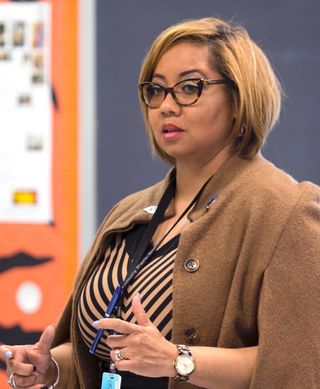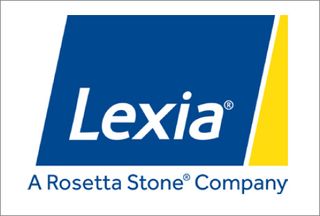Profile of Asbury Park (NJ) Superintendent Sancha Gray

For Sancha Gray, Asbury Park (NJ) School Superintendent, building a brighter future is a way of life. This is no small feat, considering that she and now-NJ Commissioner of Education Lamont Repollet stepped into a struggling district with 75% of students reading below grade level (half of those being three-to-six grades below). Just four years later, graduation rates have spiked 21.8% and students are thriving under innovative initiatives that include blended learning, tech-rich classrooms, and exposure to hope and opportunities for lifelong success.

“We service 2,000 students—the majority qualify for free or reduced lunch. Considered a high poverty district, we provide our students with everything—uniforms, books, book bags, free breakfast, free lunch, and an after-school program with snack and dinner, served family style, with constructive conversation about their day in the classroom. We share these tools with parents so that they can reinforce the strategies at home. We just want to provide that comprehensive and wraparound support for our students and their families. We even have a backpack meal program, where we are able to discretely send home meals for over the weekend.”
Gray shared their uphill path to success at the 2018 T&L Phoenix Leadership Summit. Considering the student as a whole, she says, is key.
“With close to 85% reading below grade level, there are implications for what may or may not be happening in the home. We renovated a decade-long dormant building to create The Parents Center. When we rolled out our classroom tech demos, parents were pulling me aside, saying how much these programs (Read180, System 44, iRead, Math180) would have helped, how they wished they had this tech as kids. Now they do. We have staff, we have a computer-based monolingual English program that parents can log in and access. They can work on the same programs their children are using at their own pace—it’s private and respectful, so there’s no stigma. We offer bilingual instruction and GED classes. When we support parents’ learning, they create a culture of learning at home.”
Edtech programs that mirror video games were also brought in, building student confidence as learners won badges and advanced through the levels of the adaptive programs. A second prong of individualized direct instruction, informed by the data provided from those “games,” was rounded out by a third rotation—reading books of their choosing at their level.
“They have a lot of pride in selecting a book on their own, one that they know they can have success in reading, understanding, and completing,” says Gray.
Members of the highly competitive APSD Dream Academy (and Dream Scholars, their middle-school counterparts) are given laptops for 24/7 use. Dream Academy students—chosen through a mix of GPA, interview, teacher recommendations, and academic portfolio review—can graduate from high school with an associate degree in social science. They use the Blackboard platform to communicate with professors and engage fellow students in their courses. This fall, the first cohort of Dream Academy students will begin their junior year taking several courses at Brookdale Community College, before becoming full-time college students and completing their senior year on campus.
Tech & Learning Newsletter
Tools and ideas to transform education. Sign up below.
Literacy improvement does not take the summer off. Realizing that competing for students’ time and attention during summer-fun months required an extra burst of creativity, Gray created a program bundling literacy with sports and the kind of day-camp opportunities enjoyed in more affluent communities.
“Our Summer STEAAM (extra A for athletics) is completely free for all APSD students. Fun days are rotated with academic instruction days. This can include formal swim instruction at a Y day camp for our pre-K–first-grade students (we’re a shore community and are sharply aware that incidences of drowning are higher for Black and Hispanic children) followed up with free swim or opportunities to enjoy the camp experience. Upper elementary students receive formal golf instruction by a PGA-certified golf pro at the country club, creating a great opportunity to learn etiquette and social graces in addition to a lifelong sport they might not otherwise have access to. Lacrosse—another sport that is usually cost-prohibitive—is also being introduced and will become a regular offering.”
Gray credits the coming together of community, praising her partnerships and “Hard Hat Nation” (#hardhatnation) in getting the job done. Achievements are touted on social media, changing the tone of the district’s story to engage the public positively. Building a better future, which she defines simply as “hope and opportunity,” comes in many forms—programs like National Digital Learning Day, “The Pen Is Mightier Than the Sword” student documentary that took top honors at the Pocono Mountains Film Festival, students performing with Wyclef Jean during the Asbury Park Music and Film Festival, emotional learning programs in partnership with KYDS, competing at the Urban Debate Club at Harvard (with three first-time debaters landing in the top 5%), and even Gray’s goal of creating a Performing Arts Academy by 2020.
“We believe if we provide for our students—give them the tools that are necessary, give them access and opportunity—they will be successful and rise to the occasion. We offer experiences and a supportive environment to build their confidence. It’s not about the win; it’s about making sure they have a place at the table.”
Sascha Zuger is a lifestyle journalist for national magazines, a travel writer, and a young adult novelist. She has been covering inspirational educators and technology in the K–12 arena for Tech & Learning for the past eight years.
BACK OFFICE BUSINESS
EDWEB AND COSN PARTNER TO SUPPORT SUPERINTENDENTS AND DISTRICT LEADERS

edWeb is hosting an online community and engaging webinars to help superintendents connect and collaborate and get the maximum value from the CoSN Empowered Superintendents initiative. The initial webinar, “The Empowered Superintendent: Leading Digital Transformation,” is available on demand and features Dr. David Schuler, superintendent of Township High School District 214 (IL), and Dr. Chris Gaines, superintendent of Mehlville (MO) School District, discussing sharing strategies and building confidence as technology leaders. Monthly webinars will tackle topics such as Student Data Privacy: A Priority and Essential Commitment (October 8th) and Cyber Security: A Critical School District Priority (November 12th). Superintendents and district leaders are invited to join the edWeb Community, SuperConnected, for invitations to upcoming programs and to collaborate with peers on these topics.
AMERICORPS VOLUNTEERS IMPROVE READING OUTCOMES IN DES MOINES (IA) PUBLIC SCHOOLS

To support the district’s mission to improve student literacy proficiency, the district trained AmeriCorps members to deliver the offline instruction provided by Lexia Reading Core5. Leveraging the power of the volunteers to improve student reading outcomes requires an understanding of the instruction, the students’ needs, the data, and the resources themselves. School leaders used specific strategies to ensure that these volunteers could support instruction and help improve reading outcomes effectively. They trained volunteers to access Lexia’s reports and use the data to adjust direct instruction. The district standardized an implementation plan, so that everyone worked with a common set of tools, and helped volunteers understand the data by teaching them how to access the data of the populations they were working with and how to follow up with students who were flagged for offline instruction.
PILOT PROGRAM OFFERS FREE ROBOTICS TEACHING RESOURCES

Sony is offering a pilot program through which educators will be provided multiple KOOV kits, free of cost, along with one hour of training with the KOOV team and four weeks to experience KOOV firsthand. KOOV is an educational robotics and coding kit for ages eight and up, made up of blocks, sensors, actuators, and a companion app. The app teaches core concepts about design, coding, and robotics, and it features a 50+ hour educational course, guidance on building and coding for pre-designed robots, and a free production area to build and code new robots from scratch.
TECH USED
■ READ 180, System 44, iRead, MATH 180
■ Google Classroom—Digital learning management system using Google apps
■ MobyMax—Digital personalized learning software
■ Seesaw—Student-driven digital portfolio
■ Flipgrid—Digital tool that amplifies students’ voices
■ Autodesk Inventor CAD Software
Sascha has nearly two decades of experience as a freelance journalist writing for national magazines, including The Washington Post, LA Times, Christian Science Monitor, National Geographic Traveler, and others. She writes about education, travel and culinary topics.



